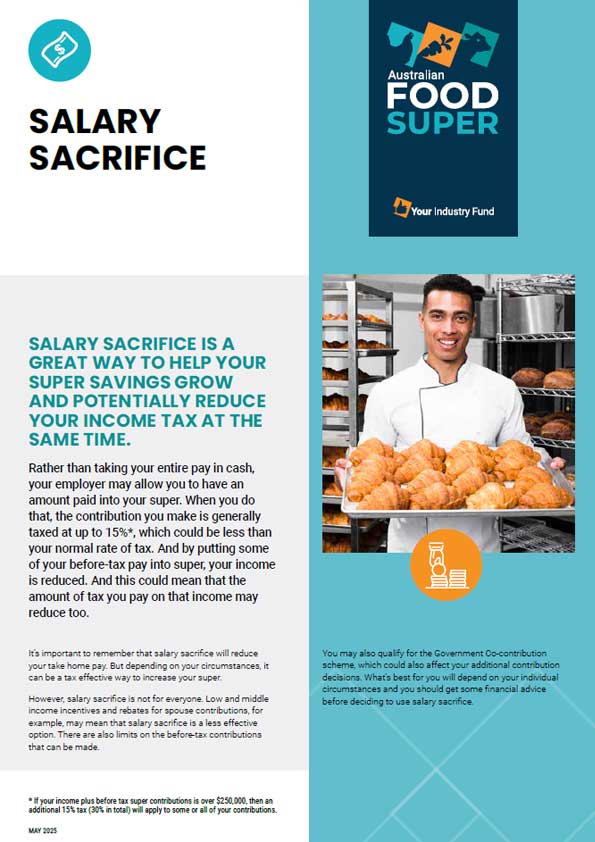Salary sacrifice is a great way to help your super savings grow and potentially reduce your income tax at the same time.
Rather than taking your entire pay in cash, your employer may allow you to have an amount paid into your super. When you do that, the contribution you make is generally taxed at up to 15%*, which could be less than your normal rate of tax. And by putting some of your before-tax pay into super, your income is reduced. And this could mean that the amount of tax you pay on that income may reduce too.
It’s important to remember that salary sacrifice will reduce your take home pay. But depending on your circumstances, it can be a tax effective way to increase your super.
However, salary sacrifice is not for everyone. Low and middle income incentives and rebates for spouse contributions, for example, may mean that salary sacrifice is a less effective option. There are also limits on the before-tax contributions that can be made.
You may also qualify for the Government Co-contribution scheme, which could also affect your additional contribution decisions. What’s best for you will depend on your individual circumstances and you should get some financial advice before deciding to use salary sacrifice.
*If your income plus before tax super contributions is over $250,000, then an additional 15% tax (30% in total) will apply to some or all of your contributions.
Let’s consider an example of how salary sacrifice may work.
The table below shows the current rates of income tax based on various levels of income for Australian residents for the 2025-26 financial year. Foreign resident rates differ and can be found at www.ato.gov.au. Note in most cases, the tax on pre-tax super contributions (eg salary sacrifice) is 15%.
| If your income is: | Then your marginal tax rate (excluding Medicare Levy) is: | And your super tax rate is*: |
| 0-$18,200 |
Nil | 15% |
| $18,201-$45,000 | 16c for each $1 over $18,200 | 15% |
| $45,001-$135,000 | $4,288 plus 30c for each $1 over $45,000 | 15% |
| $135,001-$190,000 | $31,288 plus 37c for each $1 over $135,000 | 15% |
| $190,001 and over | $51,638 plus 45c for each $1 over $190,000 | 15% or 30% if your income (plus super) exceeds $250,000 p.a. |
*Refer below for limits on contributions.
So, assuming you earn $40,000 before-tax, you’re paying potentially 16% tax on every dollar over $18,200. Let’s see what happens if you were to salary sacrifice $20 per week into your super.
| No salary sacrifice | With salary sacrifice | |
| Before-tax pay | $40,000 | $40,000 |
| Salary sacrifice ($20 per week) into super | NIL | -$1,040 |
| New before-tax pay | $40,000 | $38,960 |
| PAYG tax* (including Medicare Levy) | $4,288 | $4,100.80 |
*Includes Medicare Levy of 2%. Low income tax offset not included.
You’ve saved yourself just over $180 in tax, PLUS you’ve put $884 ($1,040 less 15% tax) into your super to help save for a better retirement.
And don’t forget, every dollar you put into your super will experience the effect of compound earnings. Compound earnings means you’re making money not just on the amounts you actually deposit in your super account but, as time goes on, also on the earnings those contributions generate. It’s earnings on your earnings, in fact! And the longer you invest, the greater the impact compound earnings will have. However, it is also critical to keep in mind that investment earnings in super can be negative, particularly over the short-term. You also need to remember that once you put money into super, you generally can’t access it until you retire.
Government Co-contribution Scheme
The Government Co-contribution is a scheme where the Government will contribute up to 50c for every $1 that you put into your super from your after-tax pay. Certain eligibility and income restrictions apply. For full details, see the Co-contribution Fact Sheet.
Limits on contributions
The Federal Government has set maximum limits (“caps”) on the amount of superannuation contributions that a person can make or receive during a financial year. If the limit is exceeded, either additional taxation will be payable, or the contribution will not be able to be accepted.
Before-tax contributions (concessional contributions)
The concessional contribution cap is currently $30,000*.
Any concessional contributions to superannuation in excess of this limit may be subject to additional taxation. However, if your total super balance is under $500,000, unused portions of the cap from previous years may be rolled over, effectively increasing your cap for a given year.
Please refer to the Australian Taxation Office (www.ato.gov.au or 13 10 20) for details.
How do I get started with salary sacrifice contributions?
Some employers do not allow salary sacrifice. Please check with your employer if you are thinking about making contributions to Australian Food Super via salary sacrifice.
If your employer does not permit salary sacrifice, then you may consider making after tax contributions. You can get similar benefits as salary sacrifice by making these contributions, then claiming a tax deduction.
Get some advice
Call the Member Hotline on 1800 808 614 to get some advice on how much you can salary sacrifice in order to maximise your retirement benefit. If you haven’t called us to seek advice before, please take the time to use this service now. This advice won’t cost you extra. It’s all included as part of your Australian Food Super membership.
*Limits are correct for the 2025-26 financial year. Caps are indexed and may increase from year to year. Visit www.ato.gov.au for up to date information.
Download the Fact Sheet
Salary Sacrifice
If you require any assistance, or would like a printed copy of this or any fact sheet, please contact the Member Hotline on 1800 808 614


